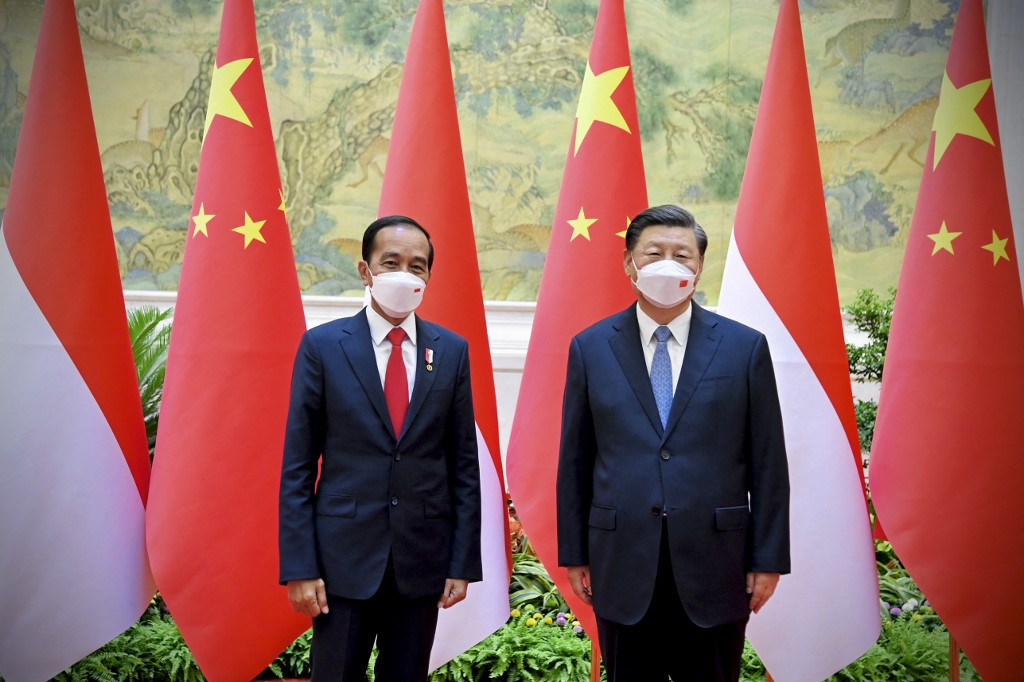Popular Reads
Top Results
Can't find what you're looking for?
View all search resultsPopular Reads
Top Results
Can't find what you're looking for?
View all search resultsPineapples and high-speed rail: Mission of economy for Indonesia and China
Rather than submarines of war, the game is about fruits, toll roads and coding of car-hailing apps that weave the web of people’s steadily improving lives.
Change text size
Gift Premium Articles
to Anyone
I
ndonesia and China decided that they will build a “China-Indonesia community with a shared future” during President Joko “Jokowi” Widodo’s trip to Beijing last week. They also agreed to uphold open regionalism in Asia. And China reaffirmed its support for ASEAN centrality. All these are big deals.
If read carefully, the joint statement also mentioned documents signed by the two countries to sell Indonesian pineapples in the Chinese market. It may seem insignificant to some, but the fact that the business of a fruit needed to be taken care of during a meeting between the two heads of state points to their seriousness about strengthening economic and trade ties at all levels.
The aspiration for economic advancement is inherent in the planned paths of both countries. Indonesia is on its way to achieving Vision 2045, the country’s roadmap to becoming a developed nation and one of the world’s five biggest economies with near-zero poverty by the centenary of its independence.
From the expansive stretch of railways on Sumatra to the enterprise of moving to a new capital, the nation’s desire to achieve prosperity is palpable. And China’s ambition of an innovative, digital and balanced economy is equally manifest in its 14th five-year plan.
Plus, foreign invasion or occupation are not distant memories for people of both nations. A shared sense is that peace was a hard-fought victory, won through blood and toil, that will be cherished every day and certainly not squandered away. And what is a better way to do that than by focusing on developing the economy so that everyone lives in affluence?
Thus, the joint statement issued during Jokowi’s stay in Beijing addressed development issues with surgical precision. On the macro-level, it made sure that the two sides meet wherever they can in their respective national schemes and their thinking on regional blueprint: it stressed synergy of China’s Belt and Road Initiative (BRI) and Indonesia’s Global Maritime Fulcrum; also, cooperation between the ASEAN Outlook on the Indo-Pacific and BRI.
Then, apart from pineapples, it chopped up other details on railways, industrial parks, vaccines and fisheries under Indonesia’s National Fish Barn project, among other things, and organized them in an orderly fashion.
On the other hand, is the common story of China and Indonesia not also a classic Asian story? The fact that ASEAN spearheaded the largest trading bloc in our world, the Regional Comprehensive Economic Partnership (RCEP), tells us something about the nature of the Asia game: Rather than submarines of war, the game is about fruits, toll roads and coding of car-hailing apps that weave the web of people’s steadily improving lives.
Indonesia and China have their respective share of responsibilities in the Asia game. China is the most populous country in the world and Indonesia has the fourth largest population, and both countries are large emerging markets. The heft of the two nations on the Asian economy is self-evident.
All things considered, it is essential that Indonesia and China -- and Asia for that matter -- remain undistracted from agendas or noises coming from outside the region. It is naïve to imagine Asia free of influence campaigns from external powers, nor is it realistic to foresee the region with less arms transactions amid the background of great-power rivalry.
Yet the Asian priorities should be economy, economy and economy, at least for a considerable while.
Finally, Asia is open for business to all; exclusiveness is not in its genes. RCEP and the Comprehensive and Progressive Agreement for Trans-Pacific Partnership are inclusive and non-discriminatory. So should be the case with United States-led Indo-Pacific Economic Framework, or any other trading or development mechanisms that seek presence in the region.
Open regionalism, the principle championed by the Asian community since as early as the 1980s, should be respected by all stakeholders working with Asia.
***
The writer is a host with CGTN Radio and former Washington bureau chief with China Radio International.










